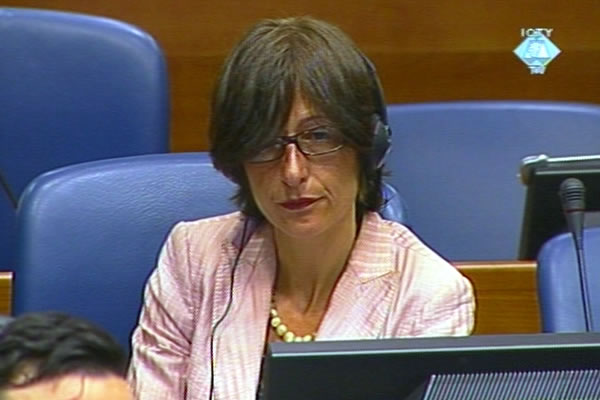Home
ON TRIAL FOR DISCLOSING A PUBLIC SECRET
The first day of the trial of Florence Hartmann, charged with contempt of court for disclosing information on the Appeals Chamber’s confidential decisions in the Slobodan Milosevic case. A prosecution witness has confirmed the protective measure protect the contents of the decisions and not the fact those decisions exist. The defense has noted that all the information the French journalist is charged with disclosing were already in public domain
 Florence Hartmann in the courtroom
Florence Hartmann in the courtroom As the first day of the trial of Florence Hartmann, French journalist on contempt of court charges drew to a close, the presiding judge asked witness, Robyn Vincent the essential question: do the protective measures ‘protect the existence or the contents of judicial decisions”.
‘The contents of the decisions’, briefly replied the current registrar of the Special Court for Lebanon, who has had long experience working in the registries of the international courts for Sierra Leone, Cambodia and the former Yugoslavia.
Florence Hartmann is charged with revealing the existence of confidential decisions the Appeals Chamber delivered in the Slobodan Milosevic case, granting confidential status to documents of the former FRY’s Supreme Council of Defense during the wars in Croatia and BH. The information was published in her book Peace and Punishment and in an article for the Bosnian Institute.
For prosecutor amicus curiae Bruce MacFarlane, the ‘Hartmann case’ is clear: the fact that Hartmann published protected information is not at issue and she did it ‘intentionally and deliberately’. Apart from producing the book and the article, MacFarlane today tried to prove this allegation with the evidence of two witnesses, Yorric Kermarrec, registrar in the publishing house that published the book Peace and Punishment and Robyn Vincent.
It remained unclear what MacFarlane wanted to achieve through Kermarrec’s evidence on the publishers’ contract with the author, the fee and printing run of the book. Through Vincent, the prosecutor wanted to highlight the importance of protective measures, particularly those concerning states. If the states can’t have trust in the protective measures, they will be reluctant to cooperate and provide legal assistance, Vincent said.
In the cross-examination, defense lawyers Karim Khan and Guenael Mettraux managed to turn both prosecution witnesses into defense witnesses. In an effort to prove that Hartmann was indicted for ‘disclosing of a public secret’, the defense tendered into evidence about ten public documents issued by the Tribunal containing the information that led to the contempt of court charges against Hartmann. Public decisions of the trial chambers in other cases, including one with Judge Moloto as the presiding judge, refer to the case law established by the Appeals Chamber’s confidential decision in the Slobodan Milosevic case on the ‘request by Serbia and Montenegro to review the decision of the Trial Chamber’ in December 2005. The defense also brought up other public documents where confidential information was disclosed before being officially ‘unsealed’ by the Tribunal.
The trial of Florence Hartmann continues tomorrow with the examination of defense witnesses Louis Joinet, former rapporteur of the UN Commission for the former Yugoslavia, Nura Alispahic from the Association of the Mothers of Srebrenica and Natasa Kandic, director of the Humanitarian Law Center in Belgrade. The accused will not testify in her defense.
Linked Reports
- Case : Contempt
- 2009-05-07 VICTIMS ASSOCIATIONS’ REQUEST DENIED
- 2009-04-21 DEFENSE: FLORENCE HARTMANN’S CASE SHOULD NOT BE RE-INITIATED OR CONTINUED
- 2009-04-20 DEFENSE STRIKES BACK
- 2009-06-16 DEFENSE: CRITICIZING JUDGES’ MOTIVES IS NOT CONTEMPT OF COURT
- 2009-06-17 WHAT ‘RESPONSIBLE BEHAVIOR’ OF A JOURNALIST IS
- 2009-07-01 NATASA KANDIC: REVIEW CONFIDENTIALITY OF SDC DOCUMENTS
